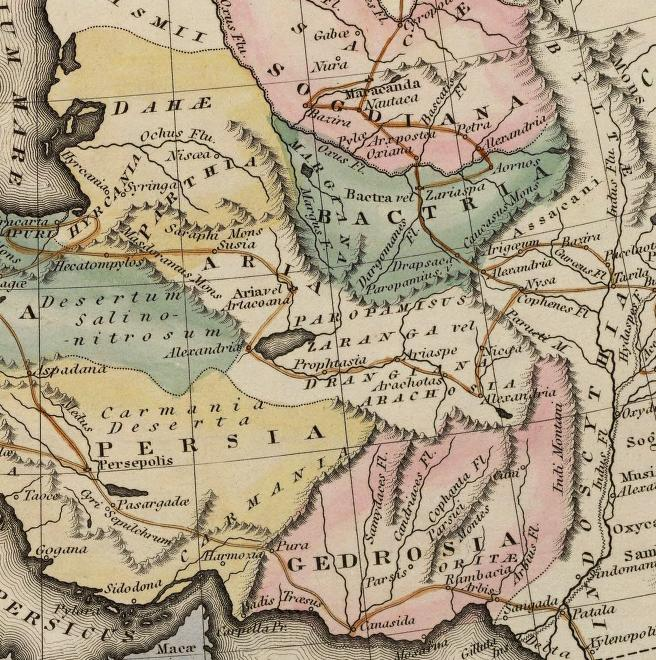Alexander the Great assumed throne after his father Philip II of Macedonia was assassinated in 336 BC. Alexander had the philosophical ideals of Aristotle and possessed experience as a warrior which ultimately prepared him to conquer the known world.
Initially, Alexander's goals were to unify Greece by defeating the Persians, however during his 10 year reign, he was able to rebuild Greece and spread culture throughout the east.
Alexander envisioned an extensive monarchy fusing Greeks, Macedonians, and the Persians into one ruling class. Of course, with the destruction of the Persian monarchy he was able to spread Greco-Macedonian rule over a larger area. This created more opportunities for engineers, merchants, soldiers, and intellectuals. Although, it does seem that he had the idea to unify his newly won domain, he did so with the spreading of cultural ideals and language.
Alexander's adoption of eastern cultures and his interest in spreading those ideals allowed his empire to become more diverse in literature, art, and architecture. Therefore the city-centers he had established were springboards for the diffusion of Greek culture.
His vision to form an extensive empire stressed the use of eastern cultures, tied into Grecian art and values, and was executed within the city states formed during his rule.
On his path to culturalization, he made the choice to push east, as far as India. On his way, he established his first series of cities in Alexandria in Egypt and he used it as a Greek administrative capital which remains today, one of the most important cities in the Mediterranean world. Alexander added Persian treasures in Susa and Persepolis, taking possession of gold and silver after the bloody battle in Gaugamela.
 In 330 BC he marched into Pakistan and into the north western area of India where the Battle of Hydaspes River was brutally fought and won. After reaching India, his troops marched tirelessly through the jungles and he meets up with King Taxilus with whom he creates an alliance to defeat Porus.
In 330 BC he marched into Pakistan and into the north western area of India where the Battle of Hydaspes River was brutally fought and won. After reaching India, his troops marched tirelessly through the jungles and he meets up with King Taxilus with whom he creates an alliance to defeat Porus.
When Alexander finally meets with Porus, he is faced with 200 elephants. There are hundreds of causalities and his troops are mutinied. He finally decides to return to Babylon.
 On the way back to Babylon, he convinces his army to go through the Gedrosian Desert because no one has before. He loses three quarters of his army and they are forced to kill the horses in order to drink their blood to quench their dying thirst. Alexander died shortly after returning to Babylon.
On the way back to Babylon, he convinces his army to go through the Gedrosian Desert because no one has before. He loses three quarters of his army and they are forced to kill the horses in order to drink their blood to quench their dying thirst. Alexander died shortly after returning to Babylon.
It wasn't until after the death of Alexander the Great that impact was felt on Western Civilization. His empire fell immediately considering it was too diverse and massive for the Macedonian monarchy to control. It was sectioned off piece by piece and given to his generals.
Greek city states, which Alexander had founded, were embedded with Greek cultures of the region. Therefore, the Eastern cultures influenced the Greeks, with the advent of mystery religions.
The spreading of cultural ideals, arts, language, philosophy, and science is truly the legacy that Alexander left.
Art and Culture

Silver coin of Alexander, British Museum

A painting by Charles Le Brun depicting Alexander and Porus (Puru) during the Battle of the Hydaspes

The Alexander Sarcophagus is one of four massive carved sarcophagi, forming two pairs, that were discovered in the necropolis near Sidon, Lebanon in 1887.
Originally thought to have been the sarcophagus of Abdalonymus (died 311 BC), the king of Sidon appointed by Alexander immediately following the Battle of Issus.







4 Comments:
I love reading about Alexander
Another fascinating article, thanks.
Another well written and interesting article.
I like history very much and your articles are great. Keep up the good job. The Alexander Sarcophagus is impresive.
Post a Comment
We appreciate comments, but we delete SPAM.